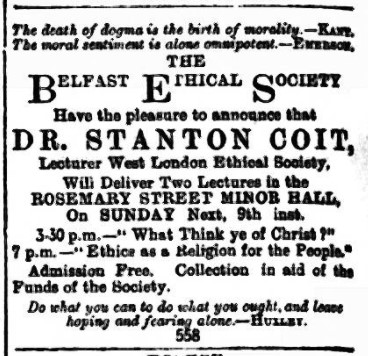

This Society has for its object the promotion of right conduct on a purely natural and human basis and the intellectual advancement of its Members. It aims at the development of character, independent of theological speculations.
Belfast Ethical Society, 1897
The Belfast Ethical Society met for the first time at the end of 1896, and held weekly meetings (aside from summer breaks) until 1913. Closely associated with the Labour movement in Belfast, its founders and key figures were J.H. Gilliland and W.M. Knox, two stalwarts of the socialist circuit, and confirmed agnostics. Over the course of its existence, the Belfast Ethical Society hosted leading lights of the wider freethought and secularist movement, including Stanton Coit, Joseph McCabe, Harry Snell, and Hypatia Bradlaugh Bonner. It joined the Union of Ethical Societies (now Humanists UK) in 1898.
All interested are invited.
Adverts for the lectures of the Belfast Ethical Society, 1896-1913
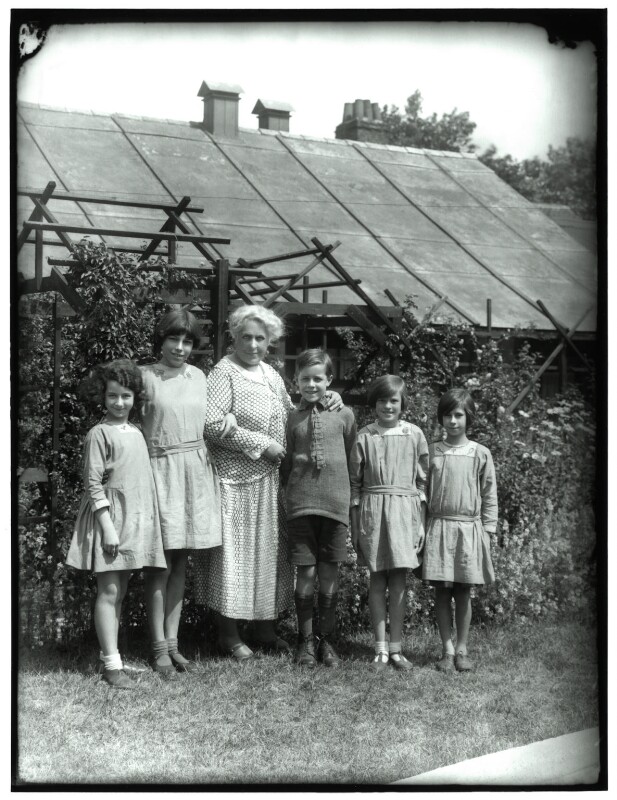
By the end of the 19th century, Belfast already had a firm tradition of secular and freethought societies, into which the Ethical Society settled naturally. The first Belfast Secular Society (a branch of the NSS) was formed in 1875: ‘Established for Mutual Improvement in Scientific Knowledge and the Abandonment of Superstition as propagated by Theological Teaching’. Though apparently short-lived, an Ulster branch again emerged in Belfast during the 1880s. It was also home to the Belfast Radical Association (1889-1891), among the aims of which was the disestablishment of the Church, as well as to a Fabian Society from 1891. The Belfast Ethical Society had its immediate roots, however, in the Independent Labour Party. Historians such as Terence Bowman and John William Boyle have described the Ethical Society as taking the place of Belfast’s ILP branch, which faded away in 1897. As Boyle notes:
Its place was taken by the Belfast Ethical Society, launched by the indefatigable W.M. Knox and his colleague J.H. Gilliland, who furnished audiences with lectures on literature, rationalism, spiritualism, evolution, and modern science— the staple intellectual fare of the ethical movement. The society carried on into the twentieth century and continued to provide a forum for progressives of various hues.
John W. Boyle, The Irish Labor Movement in the Nineteenth Century (1988)
Gilliland and Knox were indeed regular lecturers for the Society, but they also played host to a vast array of visiting speakers from throughout England and Ireland. Among these were many prominent Ethical movement figures, including Stanton Coit, Margaret McMillan, Harry Snell, Gustav Spiller, Joseph McCabe, and J.M. Robertson. Charles Watts and Chapman Cohen of the National Secular Society also lectured, as did suffragist and freethinker Teresa Billington-Greig, and socialist politician Katharine Bruce Glasier. The meetings were listed regularly in the Belfast Telegraph, the Belfast News-Letter, the Northern Whig, and socialist paper The Clarion, and sometimes reported on in depth.
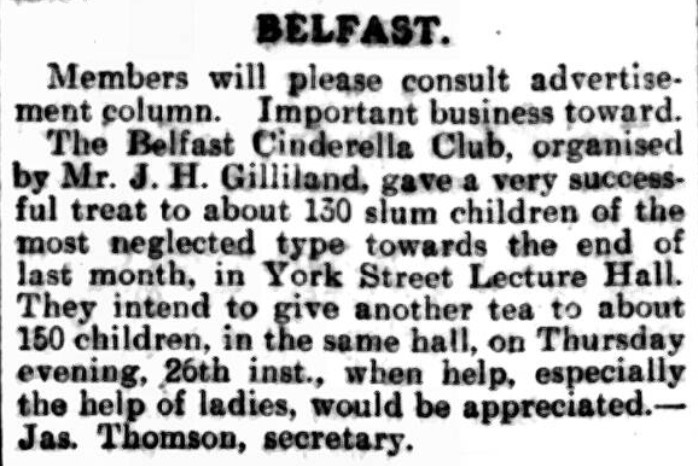
James Heron Gilliland (Secretary)
J.H. Gilliland was founding Secretary of the Belfast Ethical Society, and seemingly retained the role for its duration. Active in the socialist movement in Belfast, he was a regular speaker at the Ethical Society, as well as for socialist and secular societies. Gilliland married Margaret (Maggie) Craig in Belfast in 1879. On the 1901 census he was listed as a distillers’ clerk, and gave his religion as ‘rationalist’. In 1911, he described himself as ‘agnostic’.
Gilliland was also the organiser of Belfast’s ‘Cinderella Club’, part of a movement to provide food and entertainment for impoverished children. In February 1903, he held a tea for 130 children at the York Street Lecture Hall, 69 York Street (where Ethical Society meetings also took place).
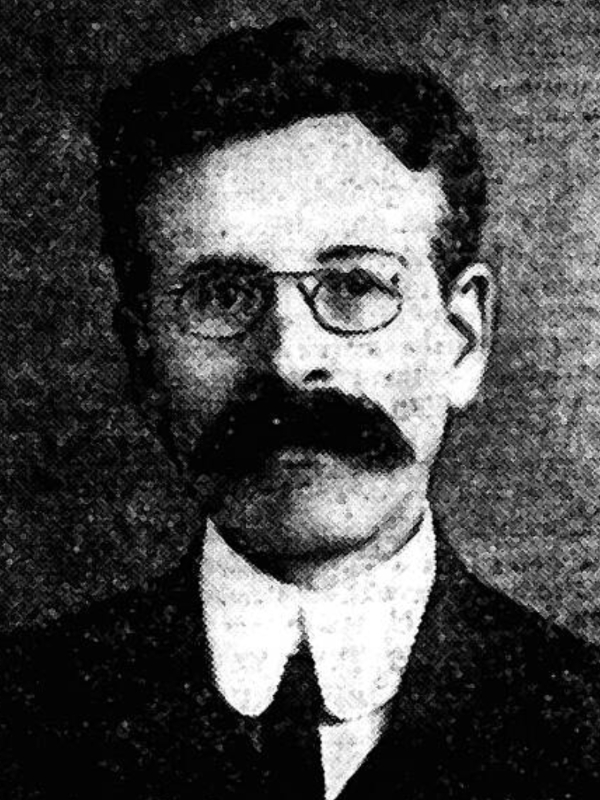
William Mayne Knox
Gilliland’s fellow founder of the Belfast Ethical Society, and a regular lecturer for the group, was described in the memoirs of James H. Cousins as ‘a one-eyed propagandist of atheism and socialism’. Cousins, a Belfast-born writer (whose wife Margaret co-founded the Irish Women’s Franchise League with Hanna Sheehy-Skeffington), recalled Knox as having been one of a ‘circle of literary friends’ who ‘developed club-consciousness, and called itself the “Kit Kat” for no more profound reason than that there had been a Kit Cat Club in London 250 years before.’
Knox was Secretary of the National Secular Society’s Ulster Branch, and of the Belfast Radical Association. He was also actively involved in the Belfast Debating Society, the Belfast and District Workers’ Educational Association, and was at various times President and Secretary of the Belfast Co-operative Society.
The Irish Labor Movement in the Nineteenth Century by John William Boyle
People’s Champion: The Life of Alexander Bowman, Pioneer of Labour Politics in Ireland by Terence Bowman
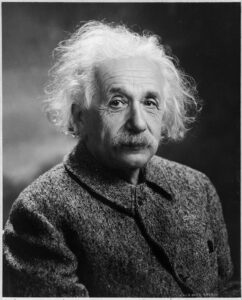
How strange is the lot of us mortals! Each of us is here for a brief sojourn; for what purpose […]

Everywhere man blames nature and fate yet his fate is mostly but the echo of his character and passion, his […]
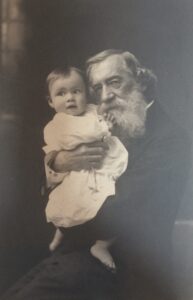
It is not because the believer in rational religion has not clear convictions that he will not shape them into […]
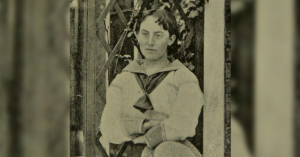
Those who, like myself, are in communication with the advanced thought and thinkers throughout the world know that hundreds —nay, […]